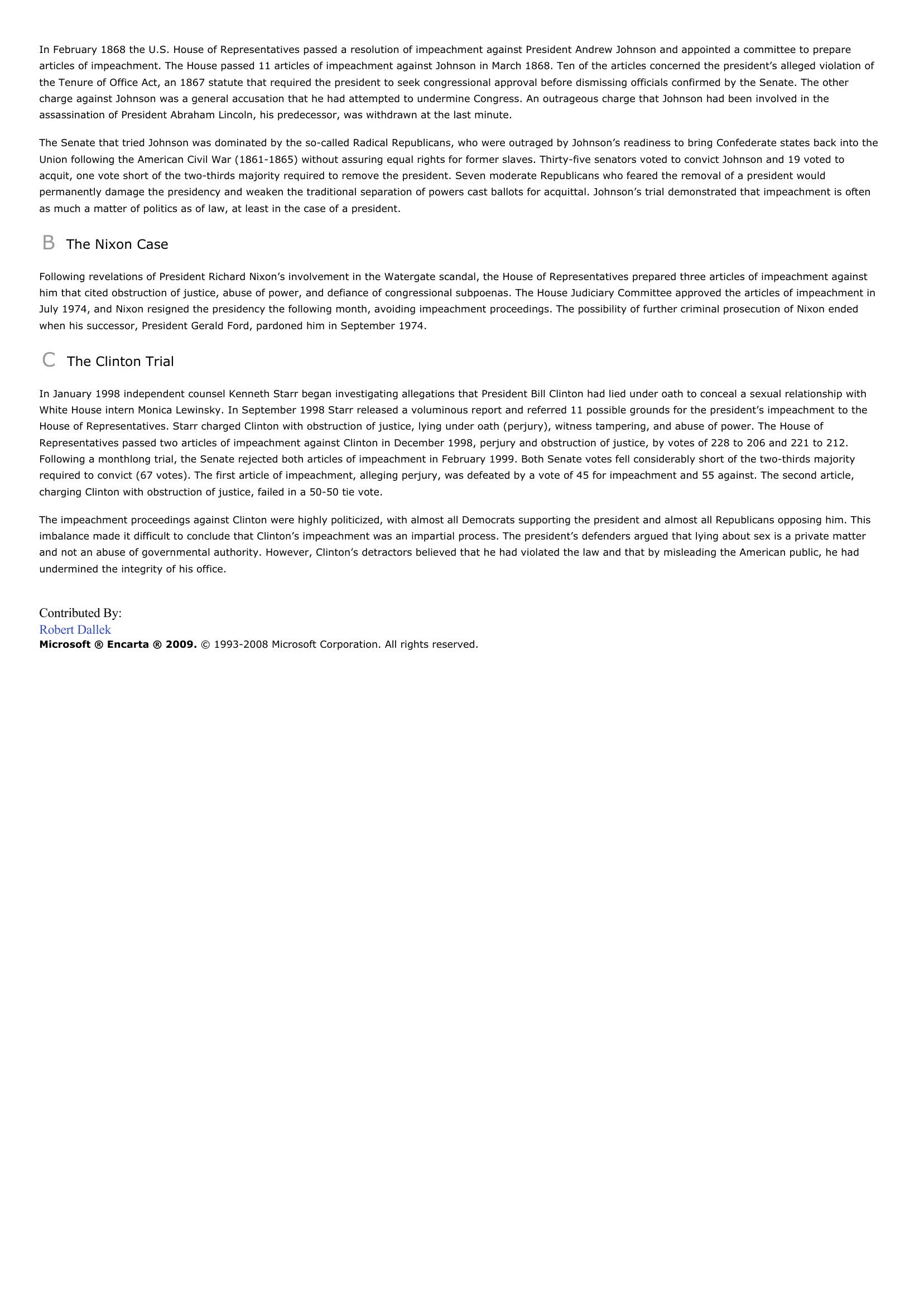Impeachment.
Publié le 10/05/2013

Extrait du document
«
In February 1868 the U.S.
House of Representatives passed a resolution of impeachment against President Andrew Johnson and appointed a committee to preparearticles of impeachment.
The House passed 11 articles of impeachment against Johnson in March 1868.
Ten of the articles concerned the president’s alleged violation ofthe Tenure of Office Act, an 1867 statute that required the president to seek congressional approval before dismissing officials confirmed by the Senate.
The othercharge against Johnson was a general accusation that he had attempted to undermine Congress.
An outrageous charge that Johnson had been involved in theassassination of President Abraham Lincoln, his predecessor, was withdrawn at the last minute.
The Senate that tried Johnson was dominated by the so-called Radical Republicans, who were outraged by Johnson’s readiness to bring Confederate states back into theUnion following the American Civil War (1861-1865) without assuring equal rights for former slaves.
Thirty-five senators voted to convict Johnson and 19 voted toacquit, one vote short of the two-thirds majority required to remove the president.
Seven moderate Republicans who feared the removal of a president wouldpermanently damage the presidency and weaken the traditional separation of powers cast ballots for acquittal.
Johnson’s trial demonstrated that impeachment is oftenas much a matter of politics as of law, at least in the case of a president.
B The Nixon Case
Following revelations of President Richard Nixon’s involvement in the Watergate scandal, the House of Representatives prepared three articles of impeachment againsthim that cited obstruction of justice, abuse of power, and defiance of congressional subpoenas.
The House Judiciary Committee approved the articles of impeachment inJuly 1974, and Nixon resigned the presidency the following month, avoiding impeachment proceedings.
The possibility of further criminal prosecution of Nixon endedwhen his successor, President Gerald Ford, pardoned him in September 1974.
C The Clinton Trial
In January 1998 independent counsel Kenneth Starr began investigating allegations that President Bill Clinton had lied under oath to conceal a sexual relationship withWhite House intern Monica Lewinsky.
In September 1998 Starr released a voluminous report and referred 11 possible grounds for the president’s impeachment to theHouse of Representatives.
Starr charged Clinton with obstruction of justice, lying under oath (perjury), witness tampering, and abuse of power.
The House ofRepresentatives passed two articles of impeachment against Clinton in December 1998, perjury and obstruction of justice, by votes of 228 to 206 and 221 to 212.Following a monthlong trial, the Senate rejected both articles of impeachment in February 1999.
Both Senate votes fell considerably short of the two-thirds majorityrequired to convict (67 votes).
The first article of impeachment, alleging perjury, was defeated by a vote of 45 for impeachment and 55 against.
The second article,charging Clinton with obstruction of justice, failed in a 50-50 tie vote.
The impeachment proceedings against Clinton were highly politicized, with almost all Democrats supporting the president and almost all Republicans opposing him.
Thisimbalance made it difficult to conclude that Clinton’s impeachment was an impartial process.
The president’s defenders argued that lying about sex is a private matterand not an abuse of governmental authority.
However, Clinton’s detractors believed that he had violated the law and that by misleading the American public, he hadundermined the integrity of his office.
Contributed By:Robert DallekMicrosoft ® Encarta ® 2009. © 1993-2008 Microsoft Corporation.
All rights reserved..
»
↓↓↓ APERÇU DU DOCUMENT ↓↓↓




